Gleðilega Páska! Posted by hulda on Apr 5, 2012 in Icelandic culture, Icelandic customs, Icelandic history
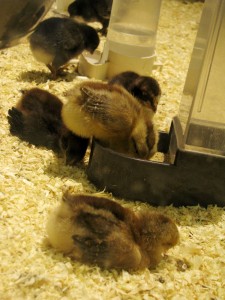 Happy Easter to all you readers! The holidays have begun in Iceland and we’re now living the dymbilvika/kyrravika (Holy Week). I’m not counting last Sunday’s Pálmasunnudagur (Palm Sunday) because the actual páskafrí (Easter holiday/vacation) officially started today and to Icelanders that is what matters the most. Freely quoting my boyfriend and a teacher of mine; blessed Christians, everyone gets days off work because of them.
Happy Easter to all you readers! The holidays have begun in Iceland and we’re now living the dymbilvika/kyrravika (Holy Week). I’m not counting last Sunday’s Pálmasunnudagur (Palm Sunday) because the actual páskafrí (Easter holiday/vacation) officially started today and to Icelanders that is what matters the most. Freely quoting my boyfriend and a teacher of mine; blessed Christians, everyone gets days off work because of them.
Today’s the Skírdagur (Maundy/Holy Thursday, Thursday of Mysteries), followed by Föstudagurinn langi (Good Friday) tomorrow. On the next Sunday will be Páskadagur (Easter Day) and right after that Annar í Páskum (Easter Monday).
As you already see in the names of days their meaning is often something completely different than it is in English. Kyrravika translates simply as “quiet week” and dymbilvika possibly comes from an old word dymbill, which loosely translates into “to make church bells ring in a sorrowful tone” (I love Icelandic). This was done by either dressing up the clapper of the bell or ringing it with a piece of wood instead of metal and it created a slightly muffled sound that was considered mournful.
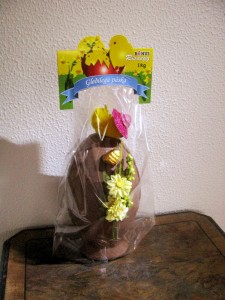 Pálmasunnudagur needs no extra explanations, I think, but Skírdagur is again different in meaning. The word skír bears the meaning “clean/cleansing” in this context and the day is named thus because Jesus Christ washed the feet of his Apostles before the Last Supper. Föstudagurinn langi means “long Friday” and is named after the suffering of Jesus. Páskadagur and Annar í Páskum are again quite straightforward.
Pálmasunnudagur needs no extra explanations, I think, but Skírdagur is again different in meaning. The word skír bears the meaning “clean/cleansing” in this context and the day is named thus because Jesus Christ washed the feet of his Apostles before the Last Supper. Föstudagurinn langi means “long Friday” and is named after the suffering of Jesus. Páskadagur and Annar í Páskum are again quite straightforward.
Iceland is a Lutheran country and this means that Easter is usually celebrated in a quiet manner, at least where religion is considered. No doubt downtown Reykjavík will be partying like no tomorrow though and that I would not call quiet by any means – Icelanders’ way of looking at any religious holiday tends toward the practical rather than mystical and any reason for a party is a good reason. Besides that, lots of effort is put into cooking, candy and all things decorative and cute. A leg of lamb is a very usual Easter food, to name an example, and when it comes to chocolate eggs I have just one things to say: oh boy.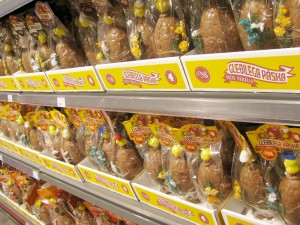
The eggs come in all sizes, although this tends to mean any size from big to enormous, and they are absolutely everywhere. The grocery stores will have piles and piles of these eggs in their colourful wrapping and still they sometimes sell out. The prices are marked on a number code where different size eggs bear a number, and the correct price is found according to it on a long list somewhere nearby.
The chocolate usually comes in three flavours (dark, milk and white chocolate) and can also be mixed with bits of caramel, liqourice etc. However, the eggs are not merely about chocolate. They’re also filled with candy!
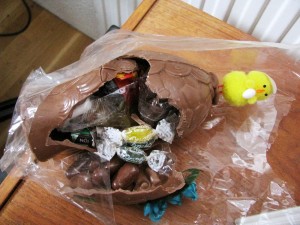
My favourite parts tends to be the proverb though. Each egg has one and it’s considered to somehow speak to the person who opens the egg, although sometimes even the Icelanders find them a little bit difficult to understand because the language can be rather archaic. This year’s theme seems to be sagas, as nearly all of my proverbs have been snippets of them. Mmmmmm yes I think I might have just admitted to having eaten several of these eggs already but please understand, they’re absolutely delicious. I’m sure that anyone would have done the same.
Have a very happy Easter! Here’s a small audio clip on how we say it in Icelandic.

Build vocabulary, practice pronunciation, and more with Transparent Language Online. Available anytime, anywhere, on any device.
About the Author: hulda
Hi, I'm Hulda, originally Finnish but now living in the suburbs of Reykjavík. I'm here to help you in any way I can if you're considering learning Icelandic. Nice to meet you!



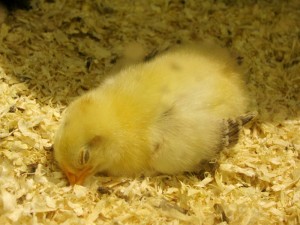

Comments:
Sequoia:
Good job! I’d mention where the live chicks in the photos are from, if it’s similar to those bunnies of previous years.
I’ll be putting up a post with some of those Easter “proverbs” next to fit the theme, if you’d like you can tell me which ones you got so I can add them in.
Hulda:
The photos are from a pet store at a mall, except that I forgot which mall it was… I’m going to have to figure that out first. I can look if I still have any of my proverbs, but I often throw them soon away so it could be that I don’t have them anymore, sorry.
Looking forward to your post!
Eric Swanson:
Thanks, Hulda for explaining the origin of the different days. Some people say “It’s just a name” but the reason behind the name is always interesting and culturally enlightening. Thanks for the efforts you are putting into this blog.
hulda:
Apologies for not replying earlier – the same problem Sequoia was having with his e-mail alerts seems to have happened to me too. Indeed, the meaning of a word can often shed a whole lot of light into the origins of a celebration, giving clues to how it was first celebrated. Often they also tell you if the celebration is actually Christian in origin at all despite its current meaning. 🙂